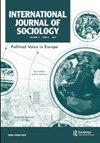‘The Merged Researcher’ and ‘Emergent Subjectivity’: Complicating Reflexivity in Migration Research
IF 1.8
Q2 SOCIOLOGY
引用次数: 0
Abstract
Abstract Qualitative migration researchers argue that reflexivity is an essential and integral component of qualitative studies involving particularly co-national/co-ethnic researchers conducting research on their co-national 1 /co-ethnic research informants in order to promote rigor and transparency. The primary objective of reflexivity in qualitative research is to ‘minimize personal bias’. Such a supposition, however, implicitly harbors assumptions of positivist epistemological objectivity that conceptualizes the qualitative researcher as detached from data and research informants. Drawing on secondary literature and my field research experiences, I argue that in qualitative migration research where the researcher shares social identities and experiences with research informants, the practice of reflexivity becomes antithesis to the practical realities of a co-constructed, value-laden and subjectivity-tainted research process. I coin the terms the merged researcher 2 and emergent subjectivity 3 to capture the inextricability of the researcher from the whole research process and the unfolding and becoming subjectivity of the researcher. These analytical concepts challenge conceptualizations of qualitative researchers’ subjectivities as problematic or bias prone. I argue that qualitative researchers’ decisions, assumptions, beliefs and experiences inseparably percolate into the research process and their social identities and subjectivities do not exist as pre-defined and stable formations but manifest and emerge during the research process.“合并的研究者”与“涌现的主体性”:移民研究中的复杂反身性
定性迁移研究人员认为,反身性是定性研究必不可少的组成部分,特别是涉及同国籍/同种族研究人员对其同国籍/同种族研究对象进行研究,以提高严谨性和透明度。定性研究中反身性的主要目标是“最小化个人偏见”。然而,这样的假设隐含着实证主义认识论客观性的假设,这种假设将定性研究者概念化为与数据和研究信息提供者分离。根据二手文献和我的实地研究经验,我认为,在定性移民研究中,研究人员与研究线人分享社会身份和经验,反身性的实践与共同构建、价值负载和主观性污染的研究过程的实际现实是对立的。我创造了“合并的研究者”和“涌现的主体性”这两个术语,以捕捉研究者与整个研究过程的不可分割性,以及研究者的主体性的展开和成为。这些分析概念挑战定性研究人员的主观性的概念化是有问题的或有偏见的。我认为,定性研究者的决定、假设、信念和经验都不可分割地渗透到研究过程中,他们的社会身份和主体性不是作为预先定义的、稳定的形态存在的,而是在研究过程中显现出来的。
本文章由计算机程序翻译,如有差异,请以英文原文为准。
求助全文
约1分钟内获得全文
求助全文

 求助内容:
求助内容: 应助结果提醒方式:
应助结果提醒方式:


